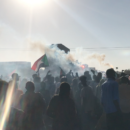Is Africa Immune to the Financial Crisis?
Might the economies of sub-Saharan Africa have special defenses against the global capitalist crisis in the relatively small role that credit and “leverage” play in consumer spending and the operations of private businesses?
I make that case in a new article distributed by Project Syndicate, which appeared in The Guardian in late March.
My piece briefly explains why Africa’s financial “marginalization” helps position the region for better economic growth during the
crisis. My argument is positive fact-based, logical – and contrary to conventional wisdom about the Sub-Saharan region – that it is weaker, poorer and more fragile than other regions in the world. Everyday life in a major African city, such as Kampala or Accra, provides evidence for the pay-as-you character of African life, both for consumers and for owners of business. Because credit is hard to obtain, “leverage,” or the role of borrowed money in household expenditures and business operations, is far less than elsewhere in the world. So Africans are indeed much better prepared to survive a global “credit squeeze” than others.
The benefits of pay-as-you-go, during a credit crisis, would have to be undeniable even to the many professional pessimists on the subject of African development. The broader question is whether the slump in global demand will harm African economies. I don’t address this question in my Guardian column in part because the answer isn’t surprising.
Yes.
African countries who produce industrial materials will especially be hurt. So will oil producers of course. But producers of food and farm products should fare better, since demand for certain crops – rice, coffee, cocoa, maize and others – should not see price and demand declines in any way approaching those happening in, say, the diamond (Botswana), copper (Zambia) or oil (Nigeria, Angola) sectors.
My hypothesis, then, is that the heavily rural character of most African countries provides another ballast against any prolonged global downturn. The insight isn’t as prosaic as insisting that most African families, even those who live in cities, have a plot of land somewhere on which they can grow food for themselves. The upside for rural Africans, who already earning more money in areas without a civil war since any time since the 1960s, is bright. Even in a period of stagnant global industrial demand, the appetite for foodstuffs will not stagnate. The middle classes of India and China remain on a trajectory towards higher-value foods, a growing percentage of which will come from Africa. European consumption of African farm output has also grown sharply in recent years – and that trend should continue. Finally, the economic downturn may compel Western government, and even China, to begin withdrawing the cash and service subsidies to some of their own agriculture sectors. China, for instance, heavily subsidizes its cotton producers, who consume valuable and water that might go to higher-value activities. That Africa will grab a greater share of global agricultural output seems inevitable.
In the short run, African economies -– individual consumers and business alike — will benefit from their relative independence from debt. How costly will the commodities bust be for Africa remains an open question.
***
G. Pascal Zachary is the author of “Married to Africa,” a memoir (Scribner, 2009). Links to his publications on African affairs can be found at www.africaworksgpz.com. He has also published a column on this topic in the Globe and Mail.





[…] journalist, author and teacher who writes frequently about African affairs. He writes at the “African Arguments” blog that there is still a bright side for rural Africans. Is Africa Immune to the […]
We have had the credit rating agencies putting up AAA signs and capitals following these over precipices and none of these were in Africa but in California.
Please listen to the video below which explains a totally different angle of the financial crisis and then thereafter read a document I presented in the UN and where I urge the world of financial regulators in 2007 to stop taxing de-facto risk-taking… since risk is the oxygen of development.
http://www.dailymotion.com/user/PerKurowski/video/x94usd_they-regulators-authorized-a-levera_news
Â
http://www.un.org/esa/ffd/hld/HLD2007/UN_FFD_Statement_Basel_Accord.pdf
Â
Cheers
Â
Per Kurowski
https://cialiswithdapoxetine.com/ cialis alternative